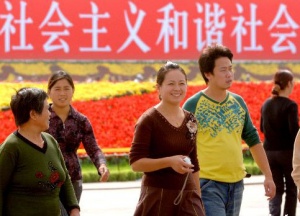“Harmonious”的版本间的差异
来自China Digital Space
| 第1行: | 第1行: | ||
| − | '' | + | <h3>''héxié'' 和谐</h3> |
| − | [[file: | + | [[file:和谐.jpg|300px|thumb|right|''"Socialist harmonious society." (Source: [http://en.people.cn/90002/95589/ People's Daily])'']]Quality in Chinese society sought by the Hu Jintao-Wen Jiabao administration (2002-2012); euphemistic attribute of censored material. |
| − | Each administration of Chinese leaders has adopted a | + | Each administration of Chinese leaders has adopted a motto to embody its governing philosophy and socioeconomic ideology. Hu Jintao's administration introduced its doctrine of [http://www.washingtonpost.com/wp-dyn/content/article/2006/10/11/AR2006101101610.html "harmonious society" (''héxié shèhuì'' 和谐社会)] in 2006, shifting the Party's focus from economic growth to ameliorating income inequality and other threats to [[stability maintenance|social stability]]. |
| − | Critics of this philosophy argue that the government has created a surface appearance of harmony by suppressing or | + | Critics of this philosophy argue that the government has created a surface appearance of harmony by suppressing or "harmonizing" elements of society that are not to the Party's liking. As online communication and mobile phone use spread under this reigning doctrine, "harmony" became a euphemism for censorship. Censored content is often said to [[be X-ed|have been "harmonized"]] (''bèi héxié'' 被和谐). |
| − | See also [[river crab]] and [[ | + | See also [[river crab]] and [[Harmony high-speed train]]. |
[[Category: Grass-Mud Horse Lexicon]][[Category:Hu Jintao]][[Category:Propaganda]][[Category:Quotable Communist Party]][[Category:Wen Jiabao]] | [[Category: Grass-Mud Horse Lexicon]][[Category:Hu Jintao]][[Category:Propaganda]][[Category:Quotable Communist Party]][[Category:Wen Jiabao]] | ||
2015年11月18日 (三) 19:59的版本
héxié 和谐

Quality in Chinese society sought by the Hu Jintao-Wen Jiabao administration (2002-2012); euphemistic attribute of censored material.
Each administration of Chinese leaders has adopted a motto to embody its governing philosophy and socioeconomic ideology. Hu Jintao's administration introduced its doctrine of "harmonious society" (héxié shèhuì 和谐社会) in 2006, shifting the Party's focus from economic growth to ameliorating income inequality and other threats to social stability.
Critics of this philosophy argue that the government has created a surface appearance of harmony by suppressing or "harmonizing" elements of society that are not to the Party's liking. As online communication and mobile phone use spread under this reigning doctrine, "harmony" became a euphemism for censorship. Censored content is often said to have been "harmonized" (bèi héxié 被和谐).
See also river crab and Harmony high-speed train.




